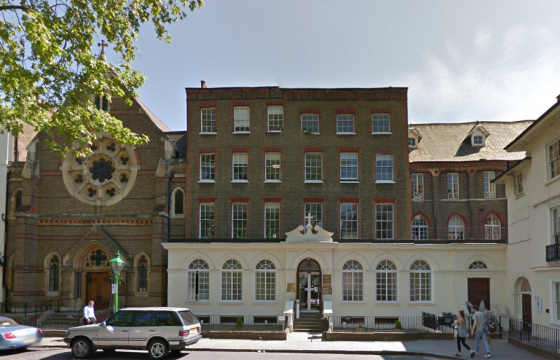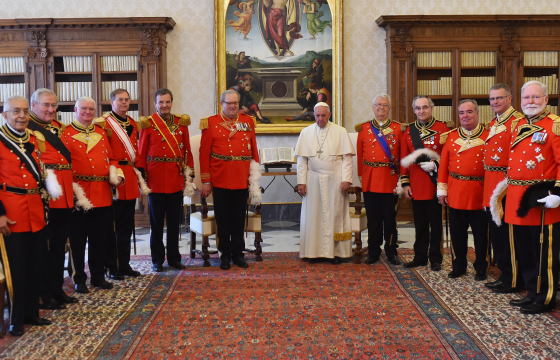The Knights of Malta leader has resigned after becoming locked in a public row with Pope Francis and the Vatican.
Following a meeting with Francis yesterday the Grand Master, Matthew Festing, was asked to resign, a spokesman for the order explained, in what is a highly unusual move in the Order of Malta’s almost 1,000 year history.
His temporary replacement will be Austrian Ludwig Hoffmann-Rumerstein who is reportedly close to the German Albrecht Von Boeselager, whom Festing sacked.
Francis has also appointed a "pontifical delegate" for the order of Malta in a move seen as containing the influence of Cardinal Raymond Burke. This will heavily constrain Burke's influence as patron of the order, whose job is to be the liaison with the Holy See.
Festing’s departure, which still needs to be formally accepted by the knights’ sovereign council, is connected to the deep dissatisfaction inside the order with his leadership.
While the more progressive German branch of the order want to promote its lay-centred work with the poor and sick, Festing has pushed a more conservative agenda by trying to build up the the elite quasi-monastic arm of the knights. Although numbering only around 50 of the 14,000 members of the order, they are the ones who hold the leadership positions of the world-wide knights, and elect its leader.
The row with the Pope started after Festing sacked and suspended one of the order’s most senior knights, Albrecht Von Boeselager, over a row about the distribution of condoms. He dismissed the German aid in the presence of Cardinal Raymond Burke, a prominent critic of Pope Francis. Both Burke and Festing claimed the action against Boeselager was backed by the Holy See.
But this claim was later debunked by letters revealing the Pope and the Vatican had never called for the sacking and instead wanted the matter resolved with dialogue.
Sources inside the order seeking reform say Festing and his allies want the “good old days” of 1950s Catholicism, with the old rite Mass and autocratic leadership.
The President of the knights’ German Association, Erich Lobkowicz, told the National Catholic Register that his had been a “battle between all that Pope Francis stands for and a tiny clique of ultraconservative frilly old diehards in the Church — diehards that have missed the train in every conceivable respect”.
Meanwhile, in Argentina the Pope had his own dispute with the knights who had been part of a nexus of opposition against him as Archbishop of Buenos Aires.
Francis is wary of Catholic chivalric orders, which he worries can show signs of profligacy and “spiritual worldliness”; when a knight in Argentina sent him a first-class ticket to Rome it was reportedly shredded into pieces and returned to sender.
All this made it unwise for the Order of Malta to pick a public row with the Pope, and ultimately Francis has won the battle.
The Vatican are also aware of a child sex abuse scandal that exploded in the UK under the Grand Master's watch and which led to an inquiry by Baroness Cumberlege.
She found that three knights had made a catalogue of serious errors when handling abuse complaints made against Vernon Quaintance, a former sacristan for the Knights of Malta who was found guilty of nine sex offences including those against boys as young as 11 he had met in the 1960s and 70s.
While the three knights involved later apologised, one of them, Duncan Gallie, was appointed by Festing as a member of the order’s Sovereign Council and is living in Rome.
A former Sotheby’s representative in Northumberland, Festing was only the second Briton to lead the order: he is an affable, likeable character and a devoted member of the organisation he has led up until now.
But as the dispute threatened to damage the knights and spiral out of control, he realised it was time to go.
Who will be replacing Matthew Festing?
Ludwig Hoffmann-Rumerstein will replace Matthew Festing as an Interim Grand Master of the Order of Malta.
Hoffmann-Rumerstein was born at Innsbruck in January 1937. He studied law at Innsbruck University and then went on to study philosophy at the Gregorian. After doing his military service in Austria, he practised as a lawyer in Innsbruck from 1970-2002.
In 1968, he co-founded the Malteser Hilfsdienst (Maltese Help Service) in Tyrol, the Austrian volunteers Corps of the Order and of the Malteser Hospitaldienst Austria (MHDA). He was Commander of the latter from 1977-79 and was in charge of the MHDA hospital train for the pilgrimage to Lourdes for four years.
He entered the Sovereign Military Order of Malta in 1970 and became a Professed Knight in 1984. He was elected a member of the Sovereign Council by the Chapter General of 1984 and was appointed Grand Commander of the Order by the Chapter General of 1994, a position he held until 2004.
He was again elected Grand Commander by the Chapter General in May 2014.




 Loading ...
Loading ...